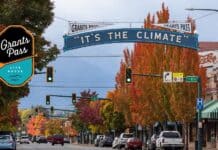The Yavapai County Sheriff’s Office plans to request Board of Supervisors approval to spend $115,000 of its Smart and Safe Arizona funds from recreational marijuana tax collections on recruitment and retention of 911 dispatchers at the board’s meeting on Wednesday, May 17.
The $115,000 is intended as an adjustment to make the department competitive against its only true competitor for dispatchers, the city of Prescott’s regional communication center, and was among the more important budget priorities laid out by Yavapai County Sheriff David Rhodes.
“Unfortunately, marijuana is doing very well in the county, and we are getting a lot of tax money from it,” Rhodes said.
Arizona voters approved the recreational sale of marijuana in 2020, with 60% of statewide voters casting their ballots in favor of Proposition 207, including 52% of Yavapai County Voters.
YCSO spokeswoman Kristin Greene said that the department doesn’t have an official position on the legalization of marijuana.
“Law enforcement agencies had to take a mind shift from ‘this is an illegal drug that we’ve been told we have to arrest people for’ to the very next day after election day, that it was no longer illegal. So when he says ‘unfortunately,’ it’s not a position and it’s not necessarily a full-on sentiment,” Greene said. “It’s just, I think it was a little longer for law enforcement to take a mind shift from illegal [to] legal.”
Marijuana sales in Arizona last year exceeded $1 billion, and how the tax revenue generated by those sales is distributed was clarified when Gov. Katie Hobbs signed HB2446 into law on April 11: 33% of cannabis tax revenue goes to community colleges, 31% to municipal police and fire departments, 25% to the Arizona highway user revenue fund and 10% to the justice reinvestment fund, according to the new legislation.
“We’ve been running about 50% vacancy in 911 operators for months. And we’ve only been able to hire one person, I believe, since November,” Rhodes said. “It’s a very tough job. This is one of those areas where the public [have] to have confidence in public safety … when you pick up the phone and dial 911, a competent, motivated person, a calm voice needs to be on the other end of that line.”
YCSO’s budget for the previous fiscal year was $61 million. The department is seeking a budget increase of 3% for the upcoming fiscal year. “That is related primarily to salaries, employee-related expenses and increased vehicle costs,” Rhodes said.
The department budgeted for 480 full-time equivalent positions, and as of last week there were 92 vacancies, which is down from 130 vacancies a year ago, Rhodes said. The total number of vacancies has been consistent during the current calendar year.
YCSO is not seeking any additional full-time equivalent positions “because I would like to create flexibility for the board [of supervisors] through compensation and benefits to recruit and retain the positions of the employees that we have right now and recruit for those 90 vacancies,” Rhodes said.
These figures do not include the cost of the new $65 million County Justice Center, which will open later this year at Prescott Lakes Parkway. The 106,000-square-foot facility will house courtrooms, the county attorney’s offices and jail facilities.
At the state level, Hobbs announced that she signed HB 2717 into law on May 1, which establishes a program to provide dispatchers and public safety employees with up to 12 visits to a licensed counselor after responding to a traumatic incident, which will be paid for by their employer.



















